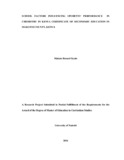| dc.description.abstract | The study was on school factors influencing students’ performance in chemistry in Kenya
Certificate of Secondary Education (KCSE) in Mbooni East Sub County, Makueni County,
Kenya. Students’ performance in Chemistry in KCSE has been influenced by various
factors which include students’ entry grade in science in Kenya Certificate of Secondary
Education (KCPE), teaching and learning methods, students’ attitude in chemistry and
assessment methods in chemistry. The study was guided by the following objectives; to
establish the extent to which students’ entry grade in science in KCPE, teaching and
learning methods, students’ attitude towards chemistry and assessment methods in
chemistry influence students’ performance chemistry in KCSE. The study was based on
Constructivist theory developed by Jorem Bruner in 1966 which states that learning is an
active process in which learners construct new ideas based upon their current or past
knowledge. The theory holds that the learner selects and transforms information, constructs
hypothesis and makes meaning from information and experiences while relying on
cognitive structure to do so. The study used descriptive survey design because it
administered questionnaires to collect data. The target population was 38 public secondary
schools in Mbooni East Sub County consisting of 38 principals, 76 chemistry teachers and
1920 form three chemistry students. Simple random sampling was used to select 12 schools
of the 38 public secondary schools, 12 principals and 24 chemistry teachers. The 1920 form
3 chemistry students were selected using stratified random sampling out of which 192
students were picked to participate. Statistical package for social sciences (SPSS) IBM
version 20 was used to analyze the data. The analyzed data was then presented through
tabular representation of frequency tables, pie chart and bar graphs. The findings showed
that teachers involve students in teaching and learning by giving individual tasks, group
tasks and performing demonstration of experiments. Most students indicated they do not
understand chemistry when lecture method is used. The study established that students
have negative attitude towards chemistry since they perceived chemistry as a difficult
subject. Students taking chemistry in preparation for KCSE do not like chemistry and
could drop it given another option. Majority of the schools do not organize field trips in
chemistry the teachers do not use project work as an assessment method. The study made
recommendations that the teaching of science in primary schools be strengthened so that
pupils gain a good base in science in preparation for transition to secondary schools where
specialization in science subjects begins to avoid wastage when candidates score low
grades in chemistry which is a crucial career subject. SMASE and teacher training institutes
to emphasize on teaching methods. Students to do physical science instead of pure
chemistry. The government through Kenya National Examination Council to consider
introducing projects in KCSE as part of assessment for chemistry in secondary schools. | en_US |



